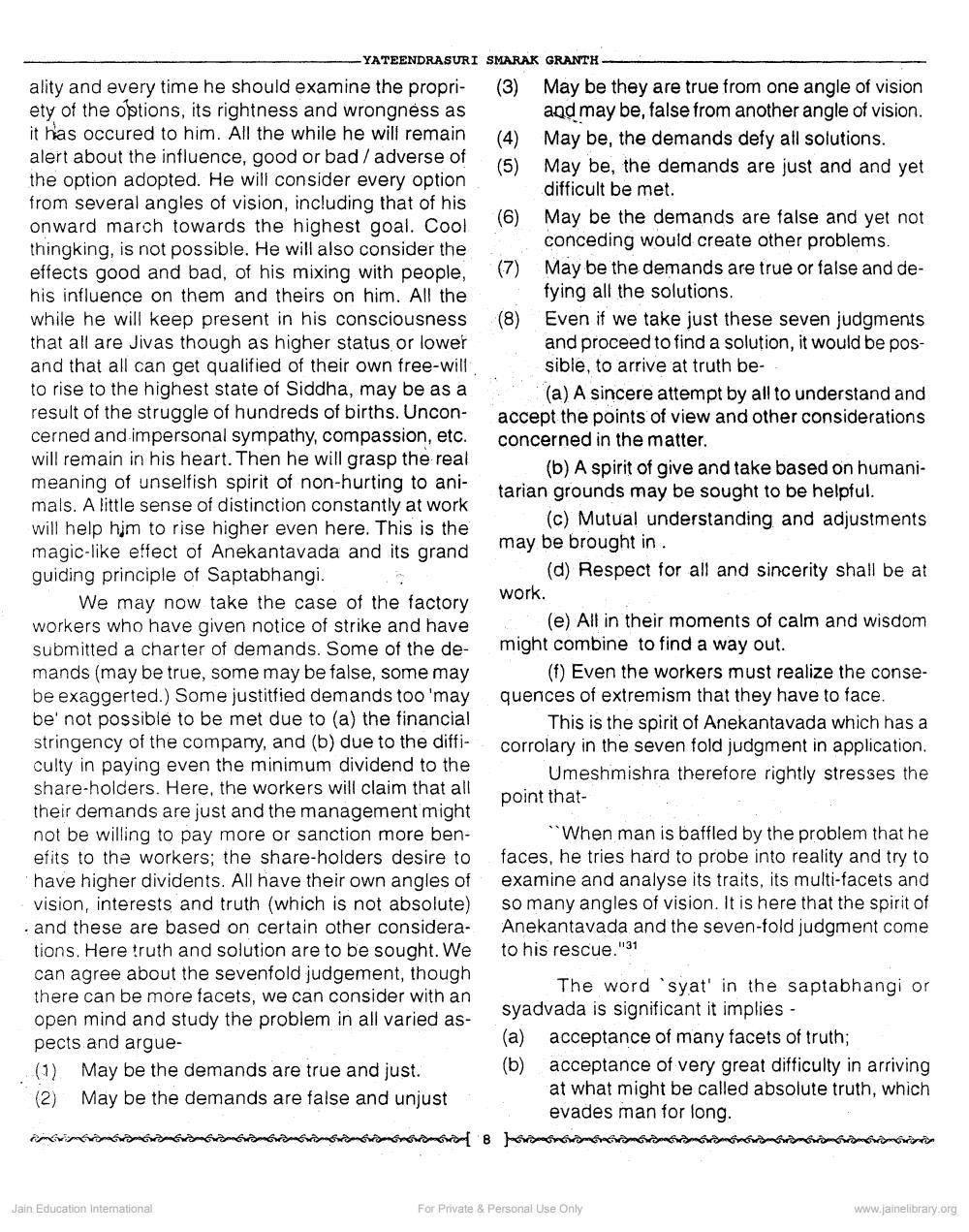________________
-YATEENDRASURI SMARAK GRANTH
ality and every time he should examine the propriety of the options, its rightness and wrongness as it has occured to him. All the while he will remain alert about the influence, good or bad / adverse of the option adopted. He will consider every option from several angles of vision, including that of his onward march towards the highest goal. Cool thingking, is not possible. He will also consider the effects good and bad, of his mixing with people, his influence on them and theirs on him. All the while he will keep present in his consciousness that all are Jivas though as higher status or lower and that all can get qualified of their own free-will to rise to the highest state of Siddha, may be as a result of the struggle of hundreds of births. Unconcerned and impersonal sympathy, compassion, etc. will remain in his heart. Then he will grasp the real meaning of unselfish spirit of non-hurting to animals. A little sense of distinction constantly at work will help him to rise higher even here. This is the magic-like effect of Anekantavada and its grand guiding principle of Saptabhangi.
We may now take the case of the factory workers who have given notice of strike and have submitted a charter of demands. Some of the demands (may be true, some may be false, some may be exaggerted.) Some justitfied demands too 'may be' not possible to be met due to (a) the financial stringency of the company, and (b) due to the diffi culty in paying even the minimum dividend to the share-holders. Here, the workers will claim that all their demands are just and the management might not be willing to pay more or sanction more benefits to the workers; the share-holders desire to have higher dividents. All have their own angles of vision, interests and truth (which is not absolute) . and these are based on certain other considerations. Here truth and solution are to be sought. We can agree about the sevenfold judgement, though there can be more facets, we can consider with an open mind and study the problem in all varied aspects and argue
(1) May be the demands are true and just. (2) May be the demands are false and unjust
Jain Education International
(3) May be they are true from one angle of vision and may be, false from another angle of vision. May be, the demands defy all solutions. May be, the demands are just and and yet difficult be met.
(4)
(5)
(6) May be the demands are false and yet not conceding would create other problems.
(7) May be the demands are true or false and defying all the solutions.
(8) Even if we take just these seven judgments
and proceed to find a solution, it would be possible, to arrive at truth be
(a) A sincere attempt by all to understand and accept the points of view and other considerations concerned in the matter.
(b) A spirit of give and take based on humanitarian grounds may be sought to be helpful.
(c) Mutual understanding and adjustments may be brought in.
(d) Respect for all and sincerity shall be at
work.
(e) All in their moments of calm and wisdom might combine to find a way out.
(f) Even the workers must realize the consequences of extremism that they have to face.
This is the spirit of Anekantavada which has a corrolary in the seven fold judgment in application. Umeshmishra therefore rightly stresses the point that
"When man is baffled by the problem that he faces, he tries hard to probe into reality and try to examine and analyse its traits, its multi-facets and so many angles of vision. It is here that the spirit of Anekantavada and the seven-fold judgment come to his rescue."31
STEG 8
The word 'syat' in the saptabhangi or syadvada is significant it implies -
(a)
(b)
acceptance of many facets of truth; acceptance of very great difficulty in arriving at what might be called absolute truth, which evades man for long.
For Private & Personal Use Only
www.jainelibrary.org




